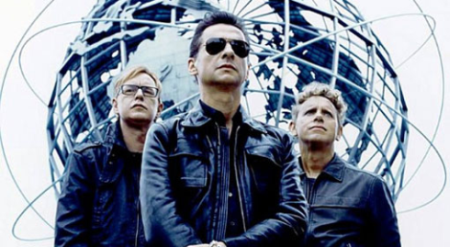
1) In Chains; 2) Hole to Feed; 3) Wrong; 4) Fragile Tension; 5) Little Soul; 6) In Sympathy; 7) Peace: 8) Come Back; 9) Spacewalker; 10) Perfect; 11) Miles Away/The Truth Is; 12) Jezebel; 13) Corrupt
Return to the old sound doesn't unfortunately equal to return to the old songwriting.
Key tracks: "In Chains", "Fragile Tension", "Miles Away/The Truth Is".
The first thing on Sounds of the Universe that leaves an impression is the sound. In fact, it’s the one thing that everyone focused on. Depeche Mode’s own comments about the album around the time of its release were largely about its chosen sound world and how the work on the album began when they dusted off some of their early synthesizers, and decided to bring them back to the spotlight. Befittingly, the fans then talked about the flashback production and how reminiscent it was of the earlier albums and the glory days. Most of the critical reception struggled to start their reviews without mentioning the production. Even the name of the album is on the game. And, well, fair enough - Sounds of the Universe does sound really nice. It’s a merger of the old and the new where older analogue synths buzz together with more modern sensibilities which is neat on its own, but the real important thing is that with it some of the overt sheen that was all over the last few albums prior to this has been scraped off. That little edge that was missing for a while is back and it complements the band’s romantic doom & gloom ethos far better than the gloss. Sounds of the Universe doesn’t feature an awe-inspiring production job by any means, but it suits the band in question perfectly.

Credit where credit is due, Sounds isn’t entirely without its merits. Gahan at least tries to get as much out of the material he’s been given as he can and his vocal performances are one of the constant shining lights throughout. The real best songs of the album – “Fragile Tension” and “Miles Away/The Truth Is” – largely repeat the tricks that worked on Playing the Angel but with diminishing returns; they’re the best of the bunch here because they actively get the listener engaged when they enter the fray by boasting the best arrangements and melodies of the album, but it wouldn’t also be particularly agonising should I never hear them again. For the most part, if anything, Sounds of the Universe proves that covering weak songwriting with a neat production job only carries for so far and for so long. Even though sonically this is probably the best Depeche Mode have been since the late-90s, it doesn’t matter much when the songs don’t have anything going on for them. And indeed - if the sound is all people talked about Sounds of the Universe around its release, it’s telling that these days people simply forget to talk at all about the album.
No comments:
Post a Comment